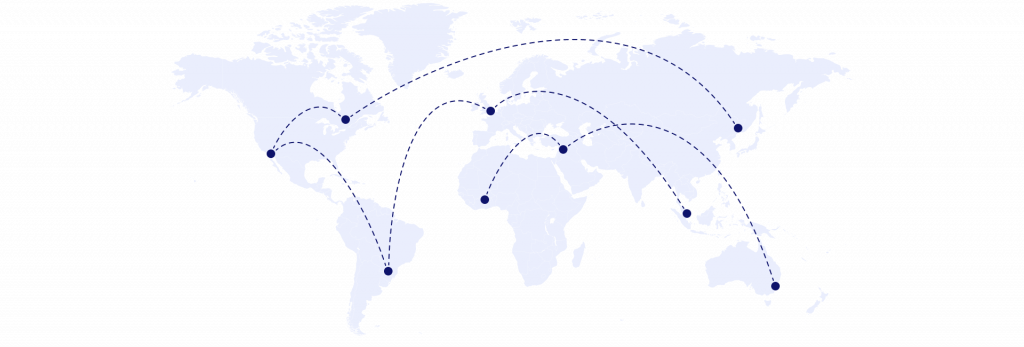Visiting suppliers in China: Your ultimate guide to business travel to China
Last updated: 14 May 2025
Your essential guide to navigating business travel in China, from building relationships to mastering local customs and tech tools.
Key takeaways
- Visiting suppliers in China builds long-term relationships and strengthens trust in the procurement process
- Formal business attire is expected, even in relaxed settings. It is better to overdress than underdress
- Punctuality shows respect in Chinese culture; arriving early for meetings is essential
- Hiring an interpreter can help bridge language gaps during crucial negotiations or presentations
- Save your hotel and important addresses in Chinese characters for easy communication with taxi drivers

Yes, you can find Chinese suppliers online, connect with them directly, check their factory reports and pictures, review product samples, and even place large volume orders–all without leaving the comfort of your office.
But when you travel to China to meet suppliers face to face, you get the opportunity to build long-term relationships and observe manufacturing processes firsthand. You can better understand the Chinese business culture and improve communication for a lasting business partnership.
A business trip to China can involve a lot of preparation, especially if it’s your first time. You need to sort out your visa, create a checklist for the factory visit, understand Chinese culture, and learn at least a few common phrases in Mandarin.
Sounds like a lot?
To help make sure your first business trip to China is a success, we have put together the ultimate guide.
Table of Contents
What are the main benefits of visiting a factory?
- Build strong work relationships: When you meet suppliers face to face in their place of work, it shows your commitment to the procurement process, which can directly lead to improved cooperation and possibly more favourable terms
- Inspect production processes and factory equipment: By checking the factory yourself, you can get a more in-depth understanding of their equipment, processes, and workforce. You can address any issues in real time and minimise misunderstandings
- Connect directly with the people in charge: Apart from meeting your point of contact, you also get the opportunity to connect with other key people in the factory
- Better negotiation: When you meet suppliers face to face and show your sincerity, it directly leads to effective communication and better price negotiation
- Check a wide variety of samples: One of the biggest benefits of visiting factories in China is being able to check a wide variety of samples yourself instead of waiting for a few shortlisted samples to get shipped to you.
Before you plan your first business travel to China
Plan your visit agenda
Decide on everything you want to achieve from your business travel to China. Make a list of all the important aspects, like checking quality control, production lines, and the factory equipment.
You should also prepare a complete list of questions you want to ask the suppliers to ensure you don’t miss anything.
You can ask questions like:
- What is the typical production lead time?
- What processes or components are subcontracted?
- How many units can be produced in a day/ week?
- What quality control measures are in place?
- How do you manage defective and low-quality products?
- Can you share references from other clients or show recently manufactured products for other customers?
Understand the Chinese business culture
Travelling to China for business is different from a leisure trip. For starters, you’ll need to familiarise yourself with local business customs and etiquette, which play a big role in establishing trust and respect. From exchanging business cards to overcoming language barriers, it pays to be prepared and, above all, culturally aware.
Doing business in China is as much about understanding the culture as it is about business itself. Respect is a big part of that, with hierarchy playing a huge role in meetings. You’ll often find that the most senior person is greeted first and spoken to more formally. Similarly, how you dress reflects this respect for status. Business attire leans towards the conservative; even in a more relaxed setting, it’s better to dress up than down.
Unless you’re invited to do so, don’t address business partners or colleagues by their first names. Instead, use their titles and surnames – for example, ‘Mr Wang’ or ‘Director Li’.
Punctuality is another sign of respect. Running late, even by a few minutes, can create the wrong impression, so it’s best to arrive at business meetings early. It shows you value the other person’s time and helps set the tone for the meeting.
Then, there’s the business card exchange. When someone hands you their card, you should take it with both hands and give it a moment of attention before putting it away. Consider getting your own cards printed in both English and Simplified Chinese – it’s a nice touch, if not absolutely necessary.
In Chinese business culture, it’s common to hear responses like ‘maybe’ or ‘let me think about it’ instead of a direct ‘no.’ This practice is linked to the concept of ‘face’ (or miànzi), which emphasises maintaining respect, dignity and social harmony in interactions. Giving a blunt ‘no’ can cause embarrassment or discomfort. By using more indirect responses, Chinese professionals can decline without offending or creating tension. Understanding this nuance is crucial, as what may seem like a tentative answer could, in reality, be a polite way of saying no.
You’ll find that business conversations often happen over meals, but don’t expect to jump into business matters right away – meals are more about developing personal connections. And when it comes to ordering, let the host take the lead by following their order or letting them decide for you.
Lastly, building relationships – or guanxi – is vital in China. Trust isn’t built on contracts and negotiations; it’s developed through personal connections and time, which is why you may feel that deals move at a slower pace than you’re used to. Chinese business culture values relationships that extend beyond the boardroom. Don’t be surprised if your counterpart wants to get to know you on a personal level before diving into business.
- Open 15+ local currency accounts and get paid like a local
- Pay suppliers, partners and staff worldwide in 100+ currencies
- Collect payments for free from 130+ marketplaces and payment gateways, including Amazon, Etsy, PayPal and Shopify
- Take control of spending with the World Card, a business expense card that saves you more with 1% cashback. Learn more
- Save with competitive exchange rates on currency conversions and transfers
- Lock in exchange rates for up to 24 months for cash flow certainty
Tips for travelling to China
Before you board
Business visa
As an Australian traveller heading to China for business, you’ll need to apply for a business visa (M visa) before departure. To apply, an official invitation letter from your Chinese business partner or host company explaining the purpose and details of your visit is required. Along with the letter, you’ll submit your passport, completed application forms and a few recent passport-sized photos.
Depending on how often you expect to be travelling to China, you can apply for a single-entry, double-entry or multiple-entry M visa. Since processing times can vary based on your Chinese consulate or embassy, starting the process well in advance is a good idea.
Professional interpreter
In urban centres, or within companies used to dealing with foreign businesses, you’ll likely find a decent level of English. However, when there’s a lot riding on negotiations or presentations, or where language barriers might impact business outcomes, you might consider hiring an interpreter before you leave.
Hiring one on arrival is possible, but it could be more costly or time-consuming to find someone last minute who understands your industry.
That said, many business travellers to China manage without an interpreter by using translation apps like WeChat’s built-in translator or Google Translate (with a VPN). These tools work fine for informal settings or quick exchanges but may fall short for formal meetings or detailed discussions.
Here are a few other details you should consider before boarding your flight:
General information
Time zone: GMT + 8 hours
Dress: Formal business attire; business-casual workwear for less formal events
Electricity: Flat 3- and 2-prong plug sockets, 220v / 50Hz
In-bound flights
The most popular flight destinations in China from Australia are Beijing, Shanghai and Guangzhou. Shenzhen is growing in popularity for travellers heading to the tech hub of southern China, while Chengdu is a major hub for western China.
Payment methods
Digital wallets, like Alipay, are widely used in stores, restaurants and for services like taxis. We highly recommend downloading one.
Tech
Install a VPN service, like ExpressVPN, on mobile devices and laptops for your apps to work as they do at home.
Phone
Enable roaming on your mobile phone and plan. Alternatively, we recommend buying an eSIM, like Holafly, which enables you to have internet access as soon as you land in China.
On arrival
When you land, you should be prepared to navigate China with confidence
General information
Driving: Vehicles drive on the right-hand side of the road
Public transport: You can buy tickets at station vending machines or use mobile payment apps like WeChat Pay and Alipay: Some cities offer rechargeable metro cards or transport apps.
Passports: As a foreign visitor, it’s better to upload a passport copy than to use facial recognition technology for verification purposes.
WiFi
Widely available; sometimes, a local number might be needed to sign in.
Addresses
Save your hotel address and other important addresses in Chinese for taxi drivers.
Where to eat
Use recommended sites like TripAdvisor or review apps like Dianping to find the best places to eat.
Transport
In major cities, there are many transport options including taxi, metro, bullet, ferry and train.
Safety
Generally safe, but be aware of pickpockets and money fraud.
Useful apps
China has its own range of apps for making payments, sending messages and managing transportation. Make sure you have all the important apps downloaded on your phone when you land in China.

Alipay: Your all-in-one travel companion in China
Alipay is one of China’s most popular mobile payment platforms and much more than just a payment app. It’s widely used for making everyday payments, booking transportation, splitting bills, and even booking hotels.
Whether you’re grabbing a meal, shopping, or taking a taxi, Alipay is accepted almost everywhere, making it essential for travellers who want to avoid carrying cash. It also offers additional features like maps, public transportation schedules, and even money transfers between users.
What Alipay lets you do
- Make mobile payments at restaurants, shops and public transport
- Book transportation such as taxis, trains and flights
- Pay bills and utilities, if staying long-term
- Split bills with friends directly through the app
- Access local deals and promotions for restaurants and shopping
- Use mini-apps within Alipay to navigate, find services and even translate
How to open an Alipay account and link your card
- Download the app: First, download Alipay from your app store (available on both iOS and Android)
- Sign up: Open the app and sign up using your phone number. You’ll receive a verification code via SMS to complete registration.
- Link your credit card:
- Go to the ‘Account’ section of the app
- Select ‘Bank Cards’
- Tap ‘Add Card’ and enter your credit card details
Once your card is linked, you can start making payments by scanning QR codes. Using Alipay simplifies travel in China, allowing you to go cashless in a country where mobile payments are the norm.
Useful phrases
It’s good to show appreciation for Chinese culture by learning a few common phrases.
Pro tip: The popular question, “I scan or you scan me?” is often asked in stores.

Business in China is easy with a World Account
We believe you should be able to grow your business without barriers. The World Account lets you do just that. Access 15+ locally-based currency accounts to collect sales revenue from overseas buyers, no overseas address or banking relationship needed. The World Account is your easy, fast and secure way to do business like a local.
Disclaimer: The information contained is general only and largely our views. Before acting on the information you should consider whether it is appropriate for you, in light of your objectives, financial situation or needs. Although information has been obtained from and is based upon multiple sources the author believes to be reliable, we do not guarantee its accuracy and it may be incomplete or condensed. All opinions, estimates, mentioned products/services and referenced material constitute the author’s own judgement as of the date of the briefing and are subject to change without notice. WorldFirst shall not be responsible for any losses or damages arising from your reliance of such information.


How to ship products from 1688 to Australia
Planning to ship products from 1688 to Australia? Learn how to navigate freight options, customs paperwork and payment workflows to streamline your supply chain
Nov / 2025
1688 vs Alibaba: Which is better?
1688 vs Alibaba: Compare China’s top B2B platforms and find out which suits your business best. Plus learn how to pay suppliers easily with WorldFirst.
Oct / 2025
Product sourcing from China: How to get started
Learn about everything you need to know about product sourcing from China, right from finding suppliers to choosing the most cost-effective
Oct / 2025Choose a category below for more business, finance and foreign exchange support from WorldFirst.
- Almost 1,500,000 businesses have sent US$500B+ around the world with WorldFirst and its partner brands since 2004
- Your money is safeguarded with leading financial institutions





































